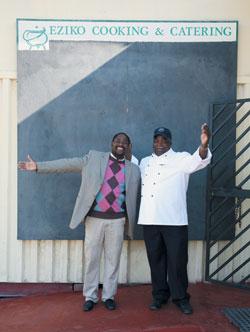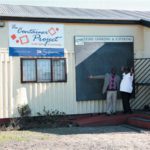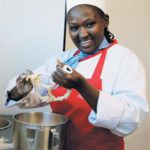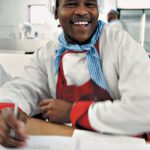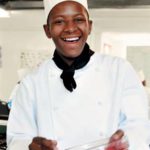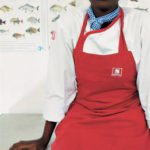Against the odds, a township cooking school in Cape Town is slowly making a difference, and forging promising careers in hotels and restaurants for its students
Dressed in a white chef’s hat and a neat uniform, two students are methodically combining flour and butter in a bowl. The oven is nearly at the correct baking temperature for scones in the making, and trainer Ashley Miller is supervising their steps. It’s a familiar scene from any professional cooking class.
The difference is that this one is in a converted container in Langa, in greater Cape Town. Eziko Cooking & Catering Training Centre accepts up to 20 full-time students for a one-year course, its students primarily from disadvantaged areas. There’s maturity and a sense of purpose in the enthusiastic group, a mixed bag of early to late twentysomething singles and parents. They’re all screened beforehand for their aptitude for cooking or baking, as well as entrepreneurial and business skills.
The six-month practical component of the course ensures that students generally meet industry standards once they’ve received their certificates. Industry partners include the Cape Town International Convention Centre, Grand West Casino and Grand Hotel, The Table Bay hotel, Winchester Mansions, The Cape Manor and independent restaurants. But it hasn’t been plain sailing behind the scenes at Eziko. Director Victor Mguqulwa founded the school 10 years ago. A teacher at the adjacent Langa High School at the time, he rounded up some learners to participate in a cooking competition. “We came third in the competition, and I realised what a great opportunity this was,” says Victor. “With help from one of the competition judges, I started a cooking school after hours. It spread like wild fire. Parents, old people and former students all wanted to learn to cook. They could find out how to make African food like samp at home, but they didn’t know how to make macaroni cheese.”
With four containers donated by Safmarine as classrooms, the cooking school initially launched as a three-month certificate course. The original containers have now been clad with bricks and cement, and the equipment vastly improved. Trainer Ashley Miller graduated from the school in 1998 and worked in industrial bakeries in a variety of supermarkets before returning to teach. “Since I studied here, new stoves and ovens have been donated. It makes a huge difference. We determine which skills are in demand in the industry and train our students accordingly. I’m a baker, although I also train students in cooking.
There’s currently a demand for bakers so we’re focusing on that side at the moment. We can concentrate our training on baking or grilling, depending on feedback from the establishments we’re supplying,” says Ashley. “Most of our students are exposed to African food already, so the African menu in Eziko’s restaurant is designed for tourists who’d like to try township food,” Ashley adds. “In the classes, we try to expose students to as wide a range of cuisines as possible.
We teach them to bake and make simple Western dishes: spaghetti Bolognese, macaroni cheese, Indian curries – things they don’t normally cook. We introduce them to various cuts of meat and poultry. We’ll show them cheeses on a chart, and use them in our dishes.” Unfortunately budget restraints mean that cheddar and occasionally feta cheese is standard, but Parmesan and other imported varieties rarely feature.
The current course for professional students involves six months of theory, followed by six-month placements in industry kitchens and dining rooms. “After their practical, we place them in an after-care programme. We help put CVs together, and invite prospective employers to our school. Around 80 percent of our students get placed,” says Victor. “We also have an open day at the end of the course. Students form small catering co-operatives, and we equip them with business plans and costings, and get groups to work together. They market their products at our open day, so we can introduce business in a practical way. Some of our students won’t go into the industry, but we’ll support these community catering industries.”
Equipping students with other skills is emphasised too. Hygiene in the school and restaurant is a priority, and students wear full uniforms every day, to familiarise themselves with hospitality industry norms. “When they are placed at hotels and restaurants, they often receive training in kitchen, service and reception,” says Ashley. “We want to train them in life skills. When you’re working you need to be versatile and know how to answer the phone too.” Eziko receives no government financial support, although government and university departments utilise the catering services of Eziko restaurant, headed by chef Lindie Koza. “We’re catering for functions at UCT this week. We’re doing lamb casserole and creamed spinach for 16 people,” Lindie grins, garnishing a platter of scones and snacks that will feature as refreshments at a Department of Water Affairs function. “We prepare and deliver. We’re famous for being the best caterers in the location!”
One of their fund-raising success stories involves former Eziko trainer Junaid de Villiers, who has been accepted for a scholarship at the Prue Leith Chefs Academy in Gauteng. The academy subsidised around 60 percent of the course costs, and Victor’s fund-raising efforts have brought in the rest. The plan is to implement Junaid’s new skills in Eziko’s classes later on. “He will return and train our students,” says Victor.
Former students are doing well in the industry too. Melford Mahluko works as a demi chef, while Madoda Mbangxa is a pastry chef at Grand West Casino. Vuyelwa Bungane and Veronica Arosi consistently put in long hours in the kitchens of The Table Bay, while Elizabeth Galant sells cakes in Johannesburg in a home industry business. Victor handles Eziko’s primary fund-raising and management roles. Tuition fees are significantly lower than most private cooking schools, but the training facility is subsidised by the restaurant’s profits. It relies primarily on overseas donations.
Donors can opt to sponsor specific students, and receive regular progress reports. Students either pay their fees up front, or the school makes arrangements with employers to deduct fees from their salaries during the practical course component. “The problem is that most cooking schools are privately funded.But my staff are very committed,” says Victor. “We’ve been running since 1997, through hard times. We’ve received good feedback from venues where our students have been placed. Language is a barrier for many of our students when they work in the industry, so we only instruct in English. The end result is our students are marketable, and we’re ensuring they’re up to standard. Importantly, they’re prepared to climb the ladder from the bottom.”
COME AND COOK
Cape Fusion Tours offers hands-on African cooking lessons for non-professionals. The class starts at 10:30am at Eziko Cooking & Catering Training Centre in Langa with a glass of homemade ginger beer and a chat about African cuisine – its traditions, diets of various tribes, and contemporary diets. A hands-on cooking lesson with head chef Lindie Koza includes dishes such as pap, chakalaka, samp and beans and a local stew. On request, adventurous eaters can learn how to prepare tripe, the local favourite. Everyone eats their prepared dishes in the restaurant afterwards, with the ambient sounds of Radio Xhosa in the background. Participants using the organised transport will have a short drive around Langa afterwards. Cost: R300 per person self-drive, and R500 per person including transport. Hands-on African cooking lessons are held on Saturdays, minimum of four bookings. Private classes are possible on any day, price on request. Visit www.capefusiontours.com or call Pam McOnie on 021-461-2437 or 083 235 9777.
EZIKO’S CURRENT STUDENTS
Nondzondelelo Ntoni, 27, is keen on working in a Vx Waterfront restaurant, or at Grand West as a waiter or in the kitchen.
Nomaindia “Insh” Penxa, 27, loves cooking. “My aim is to open my own business, my own Bx in the township,” she says.
Phiona Sovara, 28, has three children, a very accommodating husband and babysitting mother. “I was cooking at a home for HIV-positive children in Nyanga. I decided to do this course so I can learn more about cooking and baking. I often make my family a good chocolate cake,” she laughs.
Luvuyo Gqebnye, 24, cooks a mean samp and rice, but he’d like to learn about grilling meat in a hotel kitchen. He saved for course fees by operating his own fruit stand.
Busiswa Malotana, 27, was studying fashion design in Johannesburg. “I’ll pay back my fees once I’m working. I want to combine wedding catering and dress designing in a business of my own,” she says.
Grant Gulwa, 22, wants to be a pastry chef in the navy. “I’ve always liked the sea. But I only want to work there for five years. Then I want to open my own bakery,” he says.
Eziko Cooking & Catering Training Centre, corner Washington and Jungle Walk roads, Langa,Cape Town.
Eziko restaurant is open from Monday to Saturday, 8:30am – 5pm. Call 021-694-0434.

